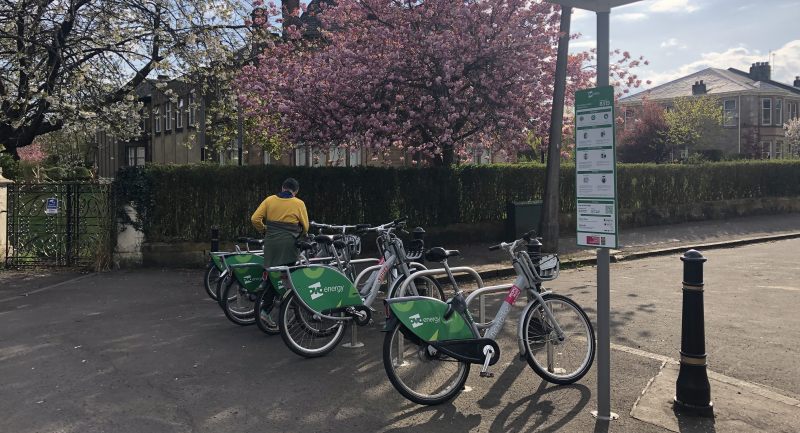Evaluation of Glasgow’s bikeshare scheme
Completed Project
Active Travel and transport
Jan 2022 - May 2023
Climate change is a global climate emergency which requires countries and cities across the world to adapt to and mitigate its impacts.
It is in this context that the development of Glasgow’s bikeshare scheme is relevant to a range of local and national climate and transport-related policies which aim to encourage more people to travel actively as part of a shift away from car use to more sustainable transport options. If achieved at a significant scale, such a shift has the potential to not only cut carbon emissions but to reduce air pollution, contribute to better places, help address transport inequalities, and improve population health.
Glasgow Centre for Population Health conducted an evaluation of the scheme in 2022.
 Project objectives
Project objectives
The overarching aims of the evaluation were:
- To describe the growth and patterns of use of Glasgow’s bikeshare scheme.
- To assess the scheme’s impact on transport inequalities in the city.
- To better understand its health and environmental benefits.
- To inform planning of further expansions of the scheme.

 What is involved
What is involved
We collected and analysed data from the beginning of the Glasgow bikeshare scheme in July 2014 to July 2022. Bike hire data were provided by nextbike, via Glasgow City Council. The analysis focussed on the following four research questions:
- How has the Glasgow bikeshare scheme expanded over time and what patterns of use have developed?
- How did the COVID-19 pandemic change patterns of use of the scheme?
- What impacts has the scheme had on transport inequalities in the city?
- How has the scheme impacted on health and environmental outcomes?
Our analysis focussed on trends and patterns in use, the potential health and environmental benefits of the scheme, and how it may be helping address transport inequalities in the city. We make recommendations for how and where the scheme could be developed and expanded.
 Findings & outcomes
Findings & outcomes
- Since the beginning of the scheme in July 2014, there have been over 1.6 million bike hires. The number of hires has risen significantly; in the period August 2021-July 2022 there were nearly 325,000 hires, representing approximately a five-fold increase on 2014/15 figures.
- Initially concentrated in the centre and west of the city, the scheme has grown steadily in the last eight years and now extends to a much larger network across the city.
- There are now over 1,150 bikes in the scheme (10% of which are e-bikes) and 103 bike hire stations, making this the biggest bikeshare scheme in Scotland and one of the largest in the UK outside of London.
- In 2022, there were over 94,000 active users of the scheme – approximately 5% of UK current bikeshare users – and 21 organisations have corporate membership.
- The total distance travelled by users of the scheme in the period July 2014-2022 was just over 3.8 million kilometres. If these journeys had been made by car, instead of by hire cycle, they would have cumulatively contributed 650 tonnes of CO2e over the eight years of the scheme.
- For simple journeys, bike hires are relatively cheap, if used on a ‘pay-as-you-ride’ basis or via a monthly or annual membership, compared to other forms of public transport.
- Glasgow’s bikeshare scheme has an important role in creating an active and sustainable transport system for the city.
Recommendations
- Further expansion of the scheme into the peripheral parts of Glasgow, including better provision for people living within Glasgow’s most deprived areas.
- Expansion of the scheme beyond the city boundary into neighbouring local authorities as an integral part of a regional sustainable transport system linked with other public transport services.
- To further increase access to and use of the scheme, explore a widened scheme to include younger adults aged 16 and 17.
- The Council and other partners should be identifying ways to make the bikeshare scheme as affordable and accessible as possible to those in most need.
 Project outputs
Project outputs
Publications & Documents
 Further resources & reading
Further resources & reading
Cycling Trends in Scotland during the Early Phase of the COVID Pandemic
Whyte B, McArthur D, Garnham L and Livingston M. Active Travel Studies. 2022
Quantifying the health and economic benefits of active commuting in Scotland
Baker G, Pillinger R, Kelly P, Whyte B. Journal of Transport and Health. 2021
Making the shift to sustainable transport in Scotland
Davis A and Whyte B. Cities & Health, 2020
Back to





